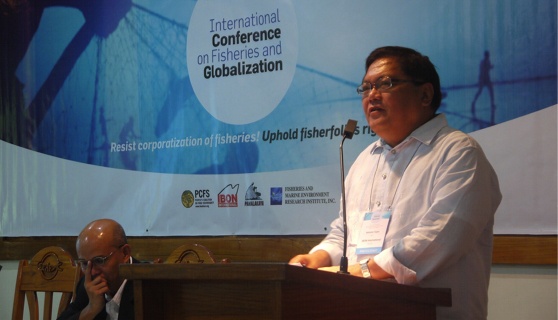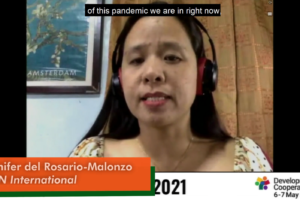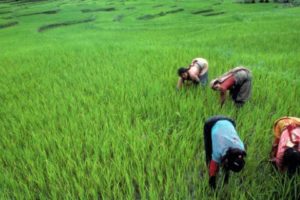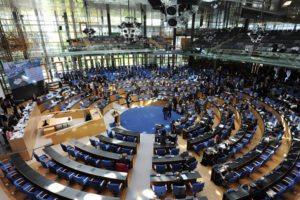Antonio Tujan Jr., IBON International Director and Co-Chair of PCFS, delivers his opening remarks at the International Conference on Fisheries and Globalization in Iloilo, Philippines (19–21 September 2012). In his remarks, Tujan stresses the need for small fisherfolk to clearly identify the root causes of their problems, their 'targets and solutions.'
___________________________________________________________________
INTERNATIONAL CONFERENCE ON FISHERIES AND GLOBALIZATION
[[{“type”:”media”,”view_mode”:”media_large”,”fid”:”64″,”attributes”:{“alt”:””,”class”:”media-image”,”height”:”178″,”style”:”font-size: 12px; width: 310px; height: 178px; margin: 10px; float: right;”,”typeof”:”foaf:Image”,”width”:”310″}}]]
Iloilo, Philippines
19 – 21 September 2012
Opening Remarks by Antonio Tujan Jr.,
Co-Chair of PCFS and International Director of IBON International
Of all the industries in the world today, we can say that the fisheries industry is the one where we are all connected. We all fish in small pockets of water from each of our countries but we know that the fish we fish are travelling around the world. The waters at our own shores are also waters that are part of the shores in other countries. Because of this, I think the fisheries sector and small-scale fisherfolks should be the most globalized, but in a different kind of globalization. In this age of globalization, this should be the age of fisheries. But the question is, what kind of globalization do we have and what kind do we want?
Ten years ago, the conference of Asian fisherfolk raised the slogan, “Cut away the net of globalization!” because the globalization that we know is neoliberal and corporate with enough destructive force behind it, that is the force of large-scale industrial fisheries run by corporations. The impact of neoliberal globalization which has been felt for decades has been criticized and indicted by many groups. That is why we are so concerned that large-scale industrial fisheries both in aquaculture and capture fisheries have threatened fish stocks to an alarming extent for the whole of humanity and most especially for the marginalized small-scale fisherfolks.
We talk of illegal fishing. But the most urgent common threat facing small fisherfolks, the greatest form of illegal fishing, is legal fishing that should be illegal to the community. It is illegal to humanity and the environment—capturing fish willy-nilly, turning them into fertilizers and oils and not really for human consumption. We know that shipping is one of the major contributors of carbon in the world today.
The general effects of climate change pose a threat to fisheries, which we are only now starting to understand. Pacific islands are disappearing under the water. In the Philippines, some of the islands are shrinking because of rising sea levels, but the bigger problem for us in the coast is of course the cyclones that are part of climate change. The ultimate effect of these typhoons, of course, is on the small-scale fisherfolks, many of whom are women quietly carrying the burden and seeking additional income to support their families.
We can see the obvious impacts, and the obvious need for small-scale fisherfolk’s inclusive participatory governance mechanisms of the seas. But this is not enough. We need to be clear about our targets and our solutions. We need to be clear where the problems lie. Many of our problems are not just across or a bit beyond our shores. It is further away. Why is it that Northern fleets of factory fishing overfish the oceans and even within our exclusive economic zones? Why are industrial and commercial fishers allowed to fish in our waters? Why is it that big trawlers with the advantage of the most modern equipment are allowed to fish in municipal fishing areas meant for small-scale fisherfolk? Is aquaculture the answer to declining fish catches?
This conference seeks to investigate things clearly; we are all experts in practice and theory. We can develop our analysis to come up with clearer policy recommendations. Specifically also, this will provide additional awareness for us so we can strengthen the capacity of our grassroots organizations and bring a stronger collective of fisherfolk across the seas.
We need also, as a third objective, to identify viable alternatives. What does sustainable fisheries development mean? This is of interest especially of course for our friends in FAO so we can better address our concerns and to lobby our governments to pay attention first and foremost to the concerns of the people, the small-scale fisherfolk, as well as to the environment, and lastly to business.
What do sustainable fisheries really mean? We must work strongly to end poverty, to end oppression. We must promote small-scale fisheries to protect the environment. It is not just about the environment. The main stewards of the marine resources, the real stewards, are the people who live there, the real fisherfolks.
Here in the Philippines, fisheries are an important issue for us because the Philippines is a collection of narrow, small mountainous islands. This does not mean to say we don’t have vast tracks of farmland but fishing is a major economic activity for a big section of the population in the Philippines. The coasts and seas provide refuge when people are displaced from their land; when the poor are forced to leave the mountains, they go to the coastal areas and try to fish there. We have sea gypsies, sea nomads. When we talk about poverty in the Philippines, it is not mainly about the slums in Manila, it’s about the people living in the coastlines.
For example, in the community exposure yesterday, the reason why the small poor fisherfolk don’t have motorized bancas is not because they are after environmental sustainability but because they are just plain poor. It is not an issue of the environment but an issue of poverty. Yet the Philippines is one of the top exporters of aquaculture products in the world. Southeast Asia is the center of fisheries production and exports in the world.
We thought that rather than have our conference in a hotel somewhere or in a beach resort, what better than to have it here in SEAFDEC. In so doing, we occupy spaces available and raise our voices closer to the research centers and highlight the condition of small fisherfolk but also the problem of fisheries in general. To SEAFDEC, we say thanks for accepting our request to hold this conference in their facilities. This is a start of what an inclusive participatory framework can be.
We’d like to thank Karibu Foundation, our main supporter for this conference, for their support through IBON. It is not such a lot of money but we are able to stretch and maximize it. We also would like to thank Misereor for the support they extended.
I would also like to thank Chandrika Sharma of ICSF for proposing back-to-back meetings and in this way for supporting the travel of some more of the participants. We are also able to share our experiences for two activities. This conference has a lot of synergies of people working together.
We do not have our conference in a capital of a country, but in a center of fisheries that is Iloilo province in the Visayan islands, where we have the SEAFDEC and UP Visayas and where we enjoy the famed hospitality of the Ilonggos. Thanks for the support of the Office of the Governor, who is scheduled to speak this afternoon. I always believe that anywhere in the world we can address international issues especially in fisheries because we are all for international solidarity.
Thank you all.




